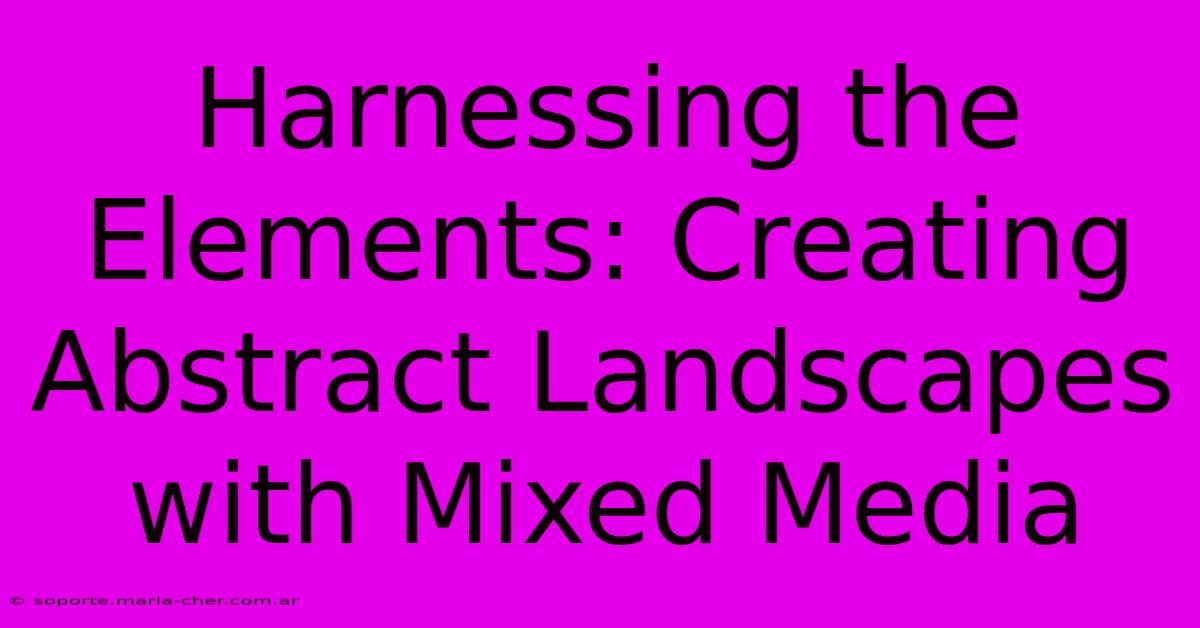Harnessing The Elements: Creating Abstract Landscapes With Mixed Media

Table of Contents
Harnessing the Elements: Creating Abstract Landscapes with Mixed Media
Abstract landscapes offer a unique opportunity to explore the emotional and visual essence of nature, unbound by the constraints of literal representation. This article dives into the exciting world of creating abstract landscapes using mixed media, exploring techniques and inspiring you to unleash your creativity. We’ll delve into material choices, layering techniques, and color palettes to help you craft compelling and evocative pieces.
Choosing Your Mixed Media Arsenal: The Foundation of Your Abstract Landscape
The beauty of mixed media lies in its versatility. For abstract landscapes, you can experiment with a wide range of materials to achieve diverse textures and effects. Consider these options:
Essential Materials:
- Acrylic Paints: A fantastic base for layering and blending, offering vibrant colors and quick drying times. Experiment with different consistencies – from thin washes to thick impasto.
- Watercolors: Perfect for creating delicate washes and soft transitions, adding a sense of ethereal beauty to your landscape. Their translucent nature allows underlying layers to subtly shine through.
- Ink: Adds bold strokes and graphic elements. Experiment with different types, such as alcohol inks for their vibrant fluidity or India ink for precise lines.
- Paper/Canvas: Choose a surface that complements your chosen materials. Thick watercolor paper can handle wet media, while canvas provides a sturdy base for textured elements.
- Collage Elements: Torn paper, fabric scraps, or even natural elements like leaves and twigs can add depth and intrigue to your abstract landscape. Consider the texture and color contrast they’ll bring.
Expanding Your Palette:
- Gesso: A fantastic primer to create texture and prepare your surface for paint. You can even use it directly to build layers and create sculptural effects.
- Pastels: Add rich, vibrant color and a velvety texture, especially useful for capturing the softness of light or the harshness of a storm.
- Pencils & Charcoal: Use these for sketching initial compositions and adding fine details later in the process.
Layering and Building Texture: Crafting Depth in Your Abstract Landscape
Layering is crucial to creating depth and visual interest in your mixed media abstract landscape. Don't be afraid to experiment!
Layering Techniques:
- Washes: Begin with thin washes of watercolor or diluted acrylics to establish a base color and mood.
- Glazing: Apply thin, transparent layers of paint over previous layers, allowing each layer to influence the next. This method beautifully reveals underlying colors.
- Impasto: Apply thick layers of paint with a palette knife or brush, creating texture and dimension.
- Dry Brushing: Use a dry brush with minimal paint to create subtle textural effects and a sense of movement.
Exploring Texture:
- Collage: Incorporate textured materials like fabric scraps, sand, or natural elements to add tactile dimension to your work.
- Gesso: Build up textured layers using gesso, creating peaks and valleys that can be painted over.
- Stamping: Use stamps with interesting textures to add repetitive patterns and visual rhythm.
Color Palettes for Evocative Abstract Landscapes
The color palette you choose is critical to the mood and atmosphere of your abstract landscape.
Harmonious Palettes:
- Analogous Colors: Colors that are adjacent to each other on the color wheel (e.g., blues, greens, and teal) create a sense of calm and harmony.
- Monochromatic Palettes: Using variations of a single color (e.g., different shades and tints of blue) can create a unified and serene effect.
Contrasting Palettes:
- Complementary Colors: Colors opposite each other on the color wheel (e.g., red and green) create a dynamic and energetic contrast.
- Split Complementary Colors: Using a color and the two colors adjacent to its complement creates a vibrant yet harmonious palette.
Don't be afraid to experiment and break the rules! The beauty of abstract art lies in its freedom of expression.
Beyond the Canvas: Displaying Your Abstract Landscape Masterpieces
Once your abstract landscape is complete, consider how best to showcase it. Framing can significantly impact the overall aesthetic. A simple, minimalist frame can allow the artwork to take center stage, while a more ornate frame can add a layer of visual interest. Consider the colors and textures within your artwork when selecting a frame.
Conclusion: Embrace the Journey of Creation
Creating abstract landscapes with mixed media is a journey of exploration and self-expression. Embrace experimentation, allow yourself to make mistakes, and enjoy the process of bringing your unique vision to life. The beauty lies not only in the final product but in the creative exploration itself. Start with these techniques and let your imagination guide you; your next masterpiece awaits.

Thank you for visiting our website wich cover about Harnessing The Elements: Creating Abstract Landscapes With Mixed Media. We hope the information provided has been useful to you. Feel free to contact us if you have any questions or need further assistance. See you next time and dont miss to bookmark.
Featured Posts
-
Maximize Your Decor With The Enchanting Power Of Bulk Dried Babys Breath Create Unforgettable Moments
Feb 08, 2025
-
Glow In The Dark St John Evening Dresses That Illuminate Your Nighttime Elegance
Feb 08, 2025
-
Revenge Or Redemption Unlv Vs Hawaii Rematch Sets The Stage For Epic Showdown
Feb 08, 2025
-
Personalized
Feb 08, 2025
-
Excuse Me We Apologize But Its Not Our Fault
Feb 08, 2025
